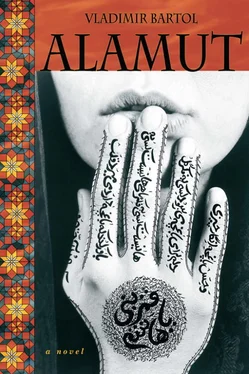Vladimir Bartol - Alamut
Здесь есть возможность читать онлайн «Vladimir Bartol - Alamut» весь текст электронной книги совершенно бесплатно (целиком полную версию без сокращений). В некоторых случаях можно слушать аудио, скачать через торрент в формате fb2 и присутствует краткое содержание. Город: Berkeley, Год выпуска: 2012, ISBN: 2012, Издательство: North Atlantic Books, Жанр: Историческая проза, на английском языке. Описание произведения, (предисловие) а так же отзывы посетителей доступны на портале библиотеки ЛибКат.
- Название:Alamut
- Автор:
- Издательство:North Atlantic Books
- Жанр:
- Год:2012
- Город:Berkeley
- ISBN:9781583946954
- Рейтинг книги:2.8 / 5. Голосов: 5
-
Избранное:Добавить в избранное
- Отзывы:
-
Ваша оценка:
- 60
- 1
- 2
- 3
- 4
- 5
Alamut: краткое содержание, описание и аннотация
Предлагаем к чтению аннотацию, описание, краткое содержание или предисловие (зависит от того, что написал сам автор книги «Alamut»). Если вы не нашли необходимую информацию о книге — напишите в комментариях, мы постараемся отыскать её.
Alamut — читать онлайн бесплатно полную книгу (весь текст) целиком
Ниже представлен текст книги, разбитый по страницам. Система сохранения места последней прочитанной страницы, позволяет с удобством читать онлайн бесплатно книгу «Alamut», без необходимости каждый раз заново искать на чём Вы остановились. Поставьте закладку, и сможете в любой момент перейти на страницу, на которой закончили чтение.
Интервал:
Закладка:
His eyes sought out Abu Ali. The grand dai stood up and spoke.
“Supreme leader, Ismaili leaders and friends, I recommend that we break all ties with Cairo and proclaim our complete independence. By doing this, we will on the one hand show the whole world that we’re confident of our power. On the other hand, this will help us win over many of those good Iranians who would have liked to join us but have been put off by our allegiance to Cairo.”
The Ismaili leaders enthusiastically welcomed this proposal. Muzaffar, however, exchanged a startled glance with Abul Fazel and remarked, “By Allah! Have you given any thought to the response of our many followers who believe that the caliph of Egypt is the true descendant of Ali and Fatima? All of them will turn away from Alamut.”
“Don’t worry, Muzaffar,” Buzurg Ummid countered. “Those followers aren’t much use to us. The ones our power depends on recognize just one battle cry: Alamut!”
“The power of our institution doesn’t depend on the number of followers we have,” Hasan explained, “but rather their quality. And it doesn’t depend on the extent of our holdings, but rather on our fortified castles. And we are the complete masters of those. A split with Cairo would signal our real birth. It would allow us to cut the umbilical cord and free ourselves completely from our mother’s body.”
Muzaffar relented. Then Abu Ali proposed that they solemnly proclaim Hasan as the founder and supreme leader of the new regime, which would continue to have its seat at Alamut. The proposal was adopted unanimously. They composed a formal document in which they proclaimed the complete independence of the Ismaili realm and named Hasan as its leader. Everyone present signed it.
Hasan rose. He thanked them for their confidence in him and named Abu Ali and Buzurg Ummid as his deputies and successors. He entrusted internal control to the former and external control to the latter.
“So,” Hasan began, “now we have clarified the relationship between ourselves and the rest of the world. We still need to think about how to increase and extend our power. Because any institution that intends to stay vital and tough can never rest. It has to remain constantly in motion and flux to preserve its agility. I know of many fine castles which are now in foreign hands but which could serve us as important footholds if we appropriated them. You’re all familiar with the fortress of Lamasar. Truly a strong, solid bastion. But the garrison that’s in it now is weak and tired of the monotony of fortress life. Buzurg Ummid, you will take as many men as you need to seize the castle. You’re to attack it without delay. Abdul Malik, with your courage and youth, you are to set out with a force of our best warriors and attack the magnificent castle of Shahdiz outside of Isfahan, which the sultan built practically to order for us before he died. You must take the castle. This way we will have any future ruler of Iran in our hands. Abu Ali, I have saved the most difficult but also the most glorious task for you. You are from Syria. There is an impregnable fortress there, Masyaf, a second Alamut, as you yourself have told me. Take as many soldiers and fedayeen as you need. With things in Iran as unstable as they are now, you should be able to fight your way there. Remember, Masyaf must fall into your hands. I want you to establish a school for fedayeen there on the model of Alamut. You will control it as you see fit, keeping me constantly informed of your initiatives. Ibn Atash, I am appointing you grand dai. You are to return to Khuzestan and take back command of Gonbadan. You will fortify the city of Girdkuh. Seize all of the fortresses in the region. If you should need a feday for any particular task, I will send you one… All of you dais who command individual forts are to be promoted from this day forward to regional dais. You will report directly to the grand dai whose seat is closest to you. This takes care of the external aspect of the hierarchy. Once you return to your castles, you will receive its internal structure in the form of a set of regulations, once those are completed. Now go join the men. Abu Ali, you will explain the action we’ve taken here and announce my arrival. Today they’ll see me for the last time.”
The Ismailis cheered enthusiastically at the news that Alamut had become a sovereign state. Abu Ali promised them new military campaigns and new victories. They whooped with joy and battle fervor. They all felt that the fortress of Alamut had long since gotten too small for them.
The supreme leader appeared on the upper terrace. A hush descended. In a voice that reached all the way down to the last horseman on the lower terrace, he proclaimed, “Faithful Ismailis! My grand dai has just announced the decisions that our council of leaders adopted today. We have truly grown powerful. But this power of ours depends completely on you and all of us being obedient. You carry out the orders of your immediate superiors, and they carry out my orders. I, in turn, remain obedient to the direction of the All-Highest who sent me here. Directly or indirectly, all of us fulfill His commands. Now go back to your duties, and quit waiting for the Mahdi. Because al-Mahdi has come!”
He didn’t wait for the cheering to subside. He withdrew with the leaders to the assembly hall and bade each of them farewell there. Then he and the grand dais withdrew to his chambers.
“So, now the fifth and final chapter of our tragedy is over,” he said with an almost melancholy smile. “There’s no one left over us, except for Allah and the unknown heavens. But we know incredibly little about either of them. So we might as well close the book of unsolved riddles once and for all.
“I’ve had enough of the world for the time being. While I wait in this retreat for the solution to the final riddle, I can’t think of a better way to occupy my time than by filling in the last details of the fairy tales for our faithful children. It’s fitting for an old man who knows the world to reveal it to the people in the form of tales and parables. There’s so much work still ahead of me! For the simplest believers I have to invent a thousand and one tales about the origins and beginning of the world, heaven and hell, the prophets, Mohammed, Ali and the Mahdi. The second grade, the fighting faithful, will need more than anything a clear rule book giving them all the commandments and prohibitions. I’ll have to embed the fairy tales into basic principles and provide them with a whole catechism. For the fedayeen I will have to reveal the first great Ismaili mysteries: the Koran is a complicated book and requires a special key to interpret it. Still higher up, those who advance to the level of dais will learn that even the Koran doesn’t contain the ultimate mysteries, and that those are equally distributed among all the different faiths. Those worthy enough to become regional dais will learn the awful supreme Ismaili principle: that nothing is true, and everything is permitted. But those of us who hold all the threads of this mechanism in our hands will save our ultimate thoughts for ourselves.”
“What a pity that you plan to shut yourself off from the world!” Buzurg Ummid exclaimed. “Now, of all times, when you’ve reached the zenith of your life’s path.”
“A man who fulfills a great mission only really comes to life once he’s dead. Especially a prophet. I’ve fulfilled mine and now it’s time to start thinking of myself. I’m going to die to other people so that I can come to life for myself. This way I’ll be able to see what will endure after me. Do you understand?”
They nodded.
“But if you were to ask me what the purpose of all this has been and why it’s been necessary, I wouldn’t be able to answer you,” he continued. “We just grow because there’s strength in us to do that. Like a seed that germinates in the earth and shoots up out of the ground, that blooms and bears fruit. Suddenly we’re here, and suddenly we’ll be gone.”
Читать дальшеИнтервал:
Закладка:
Похожие книги на «Alamut»
Представляем Вашему вниманию похожие книги на «Alamut» списком для выбора. Мы отобрали схожую по названию и смыслу литературу в надежде предоставить читателям больше вариантов отыскать новые, интересные, ещё непрочитанные произведения.
Обсуждение, отзывы о книге «Alamut» и просто собственные мнения читателей. Оставьте ваши комментарии, напишите, что Вы думаете о произведении, его смысле или главных героях. Укажите что конкретно понравилось, а что нет, и почему Вы так считаете.












